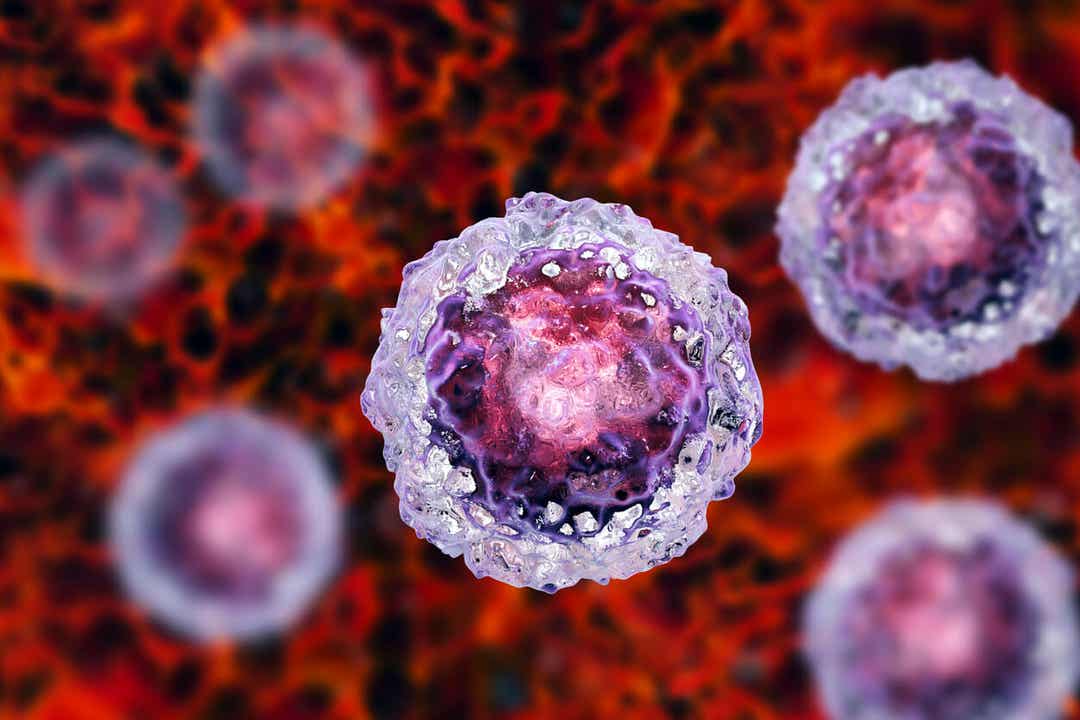Luteinizing Hormone: Functions and Normal Levels

During ovulation, blood concentrations of a substance we call luteinizing hormone increase. It has a great deal to do with reproduction and is present in both men and women, although with a slightly different role.
In the following paragraph, you’ll find some very useful information about its general characteristics, including its release, function, and clinical usefulness. Are you interested? Read on!
Luteinizing hormone: what is it?

Luteinizing hormone (LH) production takes place in the anterior portion of the pituitary gland (or hypophysis), which sits at the base of the brain. As with follicle-stimulating hormone (FSH), its release depends on the concentration of other hormones in the blood that send signals to the gland to regulate its secretion.
It’s equally important in both men and women, although they obviously have different functions. In men, it’s more to do with the regulation of testosterone secretion. In women, however, it participates actively in the ovulation process.
The levels of this substance remain more or less stable throughout a woman’s fertile life. The average concentration is ten international milliunits per milliliter. Of course, during ovulation, there’s an increase in its secretion, which usually doesn’t last more than two days.
Find out more: How Fertilization Occurs: The Miracle of Life, Step by Step
What’s the purpose of the luteinizing hormone?
Luteinizing hormone bears a close relationship to reproductive function in both sexes. In the specific case of women, its role is essential outside of pregnancy in order to allow pregnancy to occur. Within pregnancy, it loses some of its importance. We’ll tell you all about it below!
Outside of pregnancy
Ovulation is the process by which one of the two ovaries releases an egg. This egg will travel along the uterine tubes to the endometrial cavity. And, if the conditions are right, it’ll meet a sperm at some point in its journey and fertilization or conception will begin.
This hormone interacts with the cells of the ovary to help in the ovulation process. At the same time, it also promotes the production of substances that’ll eventually become estrogens. These hormones are also important in a woman’s reproductive health.
Within pregnancy
If a sperm fertilizes the egg, LH levels will remain elevated for about 15 days while a series of hormonal changes take place.
After that, the development of the embryo can take place thanks to other substances -such as progesterone or human chorionic gonadotropin. Therefore, the levels of the luteinizing hormone will gradually decrease.
Find out more: What Do Men Experience During Pregnancy?
Clinical usefulness
There are several diseases characterized by a pathological increase or decrease of luteinizing hormone in the blood. This can occur due to local problems, i.e. in the pituitary gland, or due to situations external to this gland that finally end up affecting its function.

An example of LH elevation is Turner syndrome. This is a congenital disease in which one of the sex chromosomes is missing. It’s a rare condition and one of the most striking features is the difficulty in the development of female sexual characteristics, such as breast development.
Regarding its deficiency, Kallman syndrome stands out. In this case, the origin of the problem is in the hypothalamus, which is unable to stimulate the pituitary gland to secrete this hormone. In adult women, it also implies a lack of breast development and menstrual problems.
According to several studies, the administration of this substance can help women with fertility problems, as in some cases, there’s a deficiency of the hormone.
Luteinizing hormone: an important substance
As is the case with the other hormones for reproductive health, the luteinizing hormone plays a very important role. Even though its role may seem brief, it demonstrates the complexity of a process as natural as life itself: pregnancy.
Knowing a little about this subject allows you to gain greater knowledge of the human body. And prepare for possible eventualities that may arise during pregnancy. The more you know, the more you’ll understand your doctor!
During ovulation, blood concentrations of a substance we call luteinizing hormone increase. It has a great deal to do with reproduction and is present in both men and women, although with a slightly different role.
In the following paragraph, you’ll find some very useful information about its general characteristics, including its release, function, and clinical usefulness. Are you interested? Read on!
Luteinizing hormone: what is it?

Luteinizing hormone (LH) production takes place in the anterior portion of the pituitary gland (or hypophysis), which sits at the base of the brain. As with follicle-stimulating hormone (FSH), its release depends on the concentration of other hormones in the blood that send signals to the gland to regulate its secretion.
It’s equally important in both men and women, although they obviously have different functions. In men, it’s more to do with the regulation of testosterone secretion. In women, however, it participates actively in the ovulation process.
The levels of this substance remain more or less stable throughout a woman’s fertile life. The average concentration is ten international milliunits per milliliter. Of course, during ovulation, there’s an increase in its secretion, which usually doesn’t last more than two days.
Find out more: How Fertilization Occurs: The Miracle of Life, Step by Step
What’s the purpose of the luteinizing hormone?
Luteinizing hormone bears a close relationship to reproductive function in both sexes. In the specific case of women, its role is essential outside of pregnancy in order to allow pregnancy to occur. Within pregnancy, it loses some of its importance. We’ll tell you all about it below!
Outside of pregnancy
Ovulation is the process by which one of the two ovaries releases an egg. This egg will travel along the uterine tubes to the endometrial cavity. And, if the conditions are right, it’ll meet a sperm at some point in its journey and fertilization or conception will begin.
This hormone interacts with the cells of the ovary to help in the ovulation process. At the same time, it also promotes the production of substances that’ll eventually become estrogens. These hormones are also important in a woman’s reproductive health.
Within pregnancy
If a sperm fertilizes the egg, LH levels will remain elevated for about 15 days while a series of hormonal changes take place.
After that, the development of the embryo can take place thanks to other substances -such as progesterone or human chorionic gonadotropin. Therefore, the levels of the luteinizing hormone will gradually decrease.
Find out more: What Do Men Experience During Pregnancy?
Clinical usefulness
There are several diseases characterized by a pathological increase or decrease of luteinizing hormone in the blood. This can occur due to local problems, i.e. in the pituitary gland, or due to situations external to this gland that finally end up affecting its function.

An example of LH elevation is Turner syndrome. This is a congenital disease in which one of the sex chromosomes is missing. It’s a rare condition and one of the most striking features is the difficulty in the development of female sexual characteristics, such as breast development.
Regarding its deficiency, Kallman syndrome stands out. In this case, the origin of the problem is in the hypothalamus, which is unable to stimulate the pituitary gland to secrete this hormone. In adult women, it also implies a lack of breast development and menstrual problems.
According to several studies, the administration of this substance can help women with fertility problems, as in some cases, there’s a deficiency of the hormone.
Luteinizing hormone: an important substance
As is the case with the other hormones for reproductive health, the luteinizing hormone plays a very important role. Even though its role may seem brief, it demonstrates the complexity of a process as natural as life itself: pregnancy.
Knowing a little about this subject allows you to gain greater knowledge of the human body. And prepare for possible eventualities that may arise during pregnancy. The more you know, the more you’ll understand your doctor!
All cited sources were thoroughly reviewed by our team to ensure their quality, reliability, currency, and validity. The bibliography of this article was considered reliable and of academic or scientific accuracy.
- Ruiz J, et al. Utilidad de las concentraciones de la hormona luteinizante para
determinar la calidad ovocitaria. Ginecol Obstet Mex 2005;73:28-35.
This text is provided for informational purposes only and does not replace consultation with a professional. If in doubt, consult your specialist.








